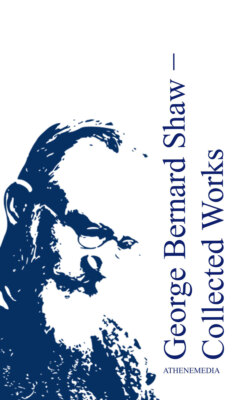Читать книгу Collected Works - George Bernard Shaw, Bernard Shaw - Страница 82
На сайте Литреса книга снята с продажи.
THE VICEROYS OF THE KING OF KINGS
ОглавлениеNow in politics it is much easier to do without God than to do without his viceroys and vicars and lieutenants; and we begin to miss the lieutenants long before we begin to miss their principal. Roman Catholics do what their confessors advise without troubling God; and Royalists are content to worship the King and ask the policeman. But God's trustiest lieutenants often lack official credentials. They may be professed atheists who are also men of honor and high public spirit. The old belief that it matters dreadfully to God whether a man thinks himself an atheist or not, and that the extent to which it matters can be stated with exactness as one single damn, was an error: for the divinity is in the honor and public spirit, not in the mouthed credo or non credo. The consequences of this error became grave when the fitness of a man for public trust was tested, not by his honor and public spirit, but by asking him whether he believed in Nobodaddy or not. If he said yes, he was held fit to be a Prime Minister, though, as our ablest Churchman has said, the real implication was that he was either a fool, a bigot, or a liar. Darwin destroyed this test; but when it was only thoughtlessly dropped, there was no test at all; and the door to public trust was open to the man who had no sense of God because he had no sense of anything beyond his own business interests and personal appetites and ambitions. As a result, the people who did not feel in the least inconvenienced by being no longer governed by Nobodaddy soon found themselves very acutely inconvenienced by being governed by fools and commercial adventurers. They had forgotten not only God but Goldsmith, who had warned them that 'honor sinks where commerce long prevails.'
The lieutenants of God are not always persons: some of them are legal and parliamentary fictions. One of them is Public Opinion. The pre-Darwinian statesmen and publicists were not restrained directly by God; but they restrained themselves by setting up an image of a Public Opinion which would not tolerate any attempt to tamper with British liberties. Their favorite way of putting it was that any Government which proposed such and such an infringement of such and such a British liberty would be hurled from office in a week. This was not true: there was no such public opinion, no limit to what the British people would put up with in the abstract, and no hardship short of immediate and sudden starvation that it would not and did not put up with in the concrete. But this very helplessness of the people had forced their rulers to pretend that they were not helpless, and that the certainty of a sturdy and unconquerable popular resistance forbade any trifling with Magna Carta or the Petition of Rights or the authority of parliament. Now the reality behind this fiction was the divine sense that liberty is a need vital to human growth. Accordingly, though it was difficult enough to effect a political reform, yet, once parliament had passed it, its wildest opponent had no hope that the Government would cancel it, or shelve it, or be bought off from executing it. From Walpole to Campbell-Bannerman there was no Prime Minister to whom such renagueing or trafficking would ever have occurred, though there were plenty who employed corruption unsparingly to procure the votes of members of parliament for their policy.
